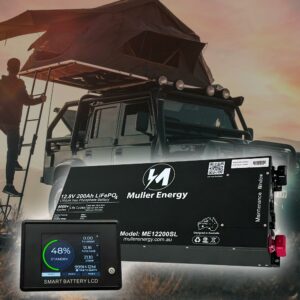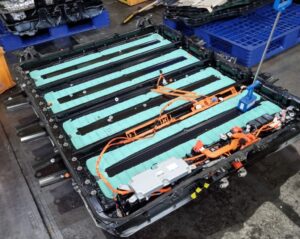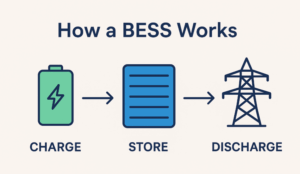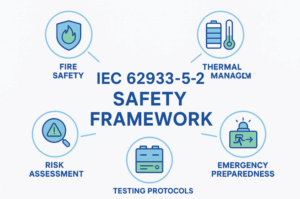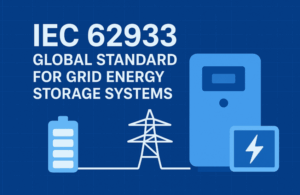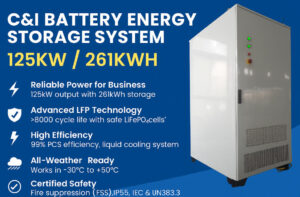The Advantages of LiFePO4 Batteries For Your Battery Energy Storage System

In the world of renewable energy and energy storage systems, LiFePO4 batteries are becoming increasingly popular. In this article, we’ll explore some of the advantages of using LiFePO4 batteries for your Battery Energy Storage System (BESS), such as their high power density and long cycle life. We’ll also examine how LiFePO4 batteries are an excellent choice for residential and commercial applications. So read on to learn more about the benefits of LiFePO4 batteries for your BESS!
Introduction to LiFePO4 Batteries
Lithium iron phosphate batteries, or LiFePO4 batteries, are a type of lithium-ion battery. Unlike other lithium-ion battery chemistries, LiFePO4 batteries use iron phosphate instead of cobalt oxide as the active material in their cathodes. This gives them several advantages over other types of lithium-ion batteries.
Lithium iron phosphate batteries have a longer life span than other lithium-ion batteries. They can be charged and discharged more times than cobalt-based lithium-ion batteries without degrading their performance.
LiFePO4 batteries also have a higher power density than other lithium-ion batteries. This means they can deliver more power per unit of weight and volume. This makes them ideal for applications with limited weight and space, such as electric vehicles.
Lithium iron phosphate batteries also have higher thermal stability than other lithium-ion batteries. This means they are less likely to catch fire or explode if they overheat.
Benefits of LiFePO4 Batteries for Battery Energy Storage Systems
Regarding battery energy storage systems, many advantages come with using LiFePO4 batteries. For one, LiFePO4 batteries are much more stable and safer than other batteries, making them ideal for critical applications. Also, Lithium iron phosphate batteries can store more energy than other types of batteries, providing a longer-lasting power source for your system. Finally, LiFePO4 batteries are also more environmentally friendly than other types of batteries, making them an excellent choice for those looking to reduce their impact on the planet.
Safety and Reliability of LiFePO4 Batteries
As we continue to see an increase in renewable energy sources, the need for reliable and safe batteries to store that energy becomes more important. Lithium iron phosphate (LiFePO4) batteries are a type of lithium-ion battery that offer many advantages over other battery technologies, making them an excellent choice for energy storage systems.
One of the biggest advantages of Lithium iron phosphate batteries is their safety. Unlike other lithium-ion batteries, LiFePO4 batteries do not contain any volatile chemicals that can cause fires or explosions. This makes them much safer to use and handle, especially in large-scale energy storage applications.
LiFePO4 batteries are also very reliable. They are designed to withstand thousands of charge/discharge cycles without significant degradation, meaning they can provide long-term energy storage for solar and wind power systems. Also, LiFePO4 batteries have a very low self-discharge rate, meaning they will retain their charge for extended periods than other battery types.
These factors make LiFePO4 batteries an excellent choice for solar and wind energy storage applications. Their safety, reliability, and long lifespan make them a wise investment for anyone looking to store renewable energy for future use.
Advantages of LiFePO4 Batteries Over Other Types of Batteries
Regarding batteries, there are many different types on the market. But if you’re looking for a powerful, long-lasting, and safe battery, then a LiFePO4 battery is the way to go.
Lithium-iron phosphate batteries have several advantages over other types of batteries. First, they are much more potent than other types of batteries. This means that they can store more energy and discharge it more quickly. Second, LiFePO4 batteries last longer than other types of batteries. They can typically be used for up to 10 years without needing to be replaced. Finally, LiFePO4 batteries are much safer than other types of batteries. They don’t pose a fire risk like some other types of batteries do.
Suppose you’re looking for a battery that can power your home or business during a power outage or provide backup power for your renewable energy system. In that case, a LiFePO4 battery is the ideal choice.
How to Choose the Right LiFePO4 Battery for Your System
Choosing the correct LiFePO4 battery for your energy storage system can be daunting. With so many different types and sizes of batteries on the market, it’s important to do your research to find the one that best fits your needs. Here are a few things to keep in mind when choosing a LiFePO4 battery:
- Battery capacity: The capacity of a battery is measured in kilowatt-hours (kWh). When choosing a battery, select one with enough capacity to meet your needs.
- Battery voltage: Most home energy storage systems use 12-volt batteries. However, some systems may require a higher-voltage battery. Be sure to check the voltage requirements of your system before making a purchase.
- Battery depth of discharge (DOD): The depth of discharge (DOD) is the percentage of a battery’s capacity that can be safely discharged without damaging the battery. For example, a 100 Ah battery with a DOD of 50% can be discharged to 50 Ah without damaging the battery. When choosing a battery, select one with a high DOD to get the most out of your investment.
- Battery cycle life: The cycle life of a battery is the number of times it can be discharged and recharged before it needs to be replaced. When choosing a battery, select one with a long cycle life for maximum value.
- Battery warranty: Most
Conclusion
LiFePO4 batteries provide an excellent option for battery energy storage systems with their high power, long cycle life, and safety advantages. They are lighter than other batteries, making them easier to install and transport. In addition, Lithium iron phosphate batteries are very cost-effective and can be used for various applications. If you’re looking for an efficient and reliable energy storage system that won’t break the bank, LiFePO4 batteries could be just what you need.
